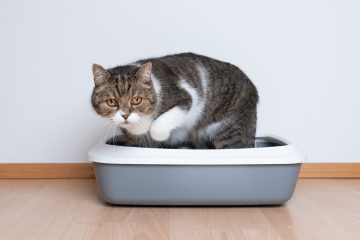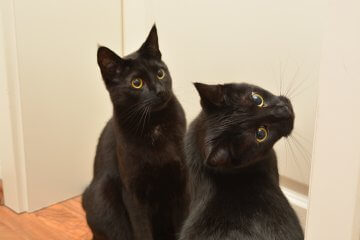If you decide to get a cat, inevitably the question arises if he or she is to live as an indoor or outdoor cat. Many people, particularly in big cities, where nobody has a big garden and life for an outdoor cat is dangerous, many cat owners decide to keep their cat indoors.
Here are some tips to help you keep your indoor cat happy:
Table of Contents
Create a living space that is appropriate for cats
An important advice is to design your animal’s living space in a way that is appropriate for the species. Having a home that meets the needs of your cat will have a positive effect on his or her well-being.
But don’t worry: You don’t need to change your home completely to meet your cat’s needs. Just make use of what’s already in your home.
As a rule, your cat’s space is divided into four different areas of life:
- Feeding area
- Rest area
- Play area
- Litter tray
Important with these is that your cat’s feeding area is not in close proximity to the litter tray. The litter tray (or trays) should also be accessible for your cat at all times. There should also be sufficient place to hide for your cat and possibilities to retreat into various areas at different heights.
Don’t worry, this doesn’t mean having the builders come in! Sofas, beds, shelves, baskets, furniture to climb on and boxes to hide in are sufficient. This already increases your cat’s quality of life and reduces stress.
A scratching post is another essential piece of equipment for cats – it not only helps to keep your cat’s claws healthy, but also strengthens the cat’s shoulder and back muscles and helps it to stretch them sufficiently.
Give your cat some company
Many people are under the false impression that cats are loners, but they are not. While they often hunt alone, they usually live with other cats. Housecats especially have been socialized with humans for a very long time and are quite far away from the lions or tigers they are related to.
As a result, cats are often sociable creatures. They love to be with each other, play with each other, they love cleaning each other’s fur and having a friend nearby. Having a feline companion is a basic need for your cat, so in most cases – particularly for indoor cats – you should get two cats rather than one. If you work eight hours a day, boredom and loneliness can be a problem for your cat and lead it to develop behavioral disorders.
Of course, the decision to buy a second cat cannot be made by the pet – the decision is made by you as the owner and it depends on many factors, such as the living space, financial resources and so on. It is also possible to keep cats and dogs together, as they often (but not always) get along splendidly.
Avoid overfeeding
Many cats, especially indoor cats, are overweight. As is true with humans, an overweight cat can also suffer from negative effects as a result. Being overweight can impair your cat’s quality of life and shorten his life expectancy.
Indoor cats usually get less exercise than outdoor cats, which can live out their hunting behavior and exercise quite naturally. Avoid obesity in your cat by playing with him and giving him plenty of opportunities to climb and run around in your home.
A scratching post and the right cat toys help keep your cat fit. Another important factor that has an impact on the weight of your cat is the diet, which leads us to the next point:
A balanced diet
Treating a cat in a way that is appropriate for the species also includes species-appropriate nutrition, which means that cat owners should always pay attention to a balanced diet. In general, wet food better fits the biology of your cat and helps your feline stay hydrated. If you want to take your cat’s nutrition completely into your own hands, you can also try the BARF diet – i.e. feeding your cat raw food you assemble yourself.
A vegetarian diet would be deadly to cats in the long run, as they have evolved to mostly eat meat. Without the protein and amino acids, they don’t get the nutrition they need.
To prevent your cats from becoming obese, watch how much you feed them. Cats don’t feel full when they’ve eaten and so they like to continue eating when their actual need is covered. Also make sure that your cat drinks enough. Although the cat absorbs some of the water through wet food, which consists of 80% water, you should always make sure that there is enough water in their bowl.
The following food should disappear in the back of the cupboard, as they are toxic to cats:
- Avocados
- Chocolate
- Coffee
- Grapes
- Stone fruit
- Raisins
- Raw potatoes
Next, let’s look at another health aspect that cat owners should be aware of:
Vaccinating and de-worming your cat
Vaccinations
Normally, indoor cats don’t have contact with other animals, which means that they don’t get cat diseases very often – unless there are other cats living in the household. It is often assumed that an indoor cat does not need to be vaccinated at all. However, there are also diseases, like the cat flu, which can occur without direct contact with other cats of the same species.
Talk to your vet about which vaccinations they recommend and then make sure you keep them up to date. If you want to give your cat to a kennel every once in a while when you go on vacation, you usually have to show that the last vaccination was less than a year ago.
De-worming
In the past, the rule of thumb was that an adult cat should be de-wormed once a quarter. The ESCCAP (European Scientific Counsel Companion Animal Parasites) has revised this rule and today the treatment of domestic cats is more oriented towards the individual situation, as the treatment of indoor cats differs from that of outdoor cats. If there are still outdoor cats living in the household, it is recommended to perform one de-worming per quarter. If the indoor cat has no contact with outdoor cats or other animals, this is not necessary. Make sure to talk to your vet about it.
You should also consider spaying or neutering your cat, as this has many advantages. Apart from the fact that the cats are no longer in heat (and males are less likely to spray, which you really don’t want indoor cats to do), neutered cats have a decreased willingness to fight, which keeps them safer from injuries. It also extends their life expectancy.
Conclusion
There are numerous things that cat owners should pay attention to when keeping an indoor cat to make sure to give the animal a healthy and happy life. The good news for everyone is that no fundamental changes need to be made and almost every home offers resources to make the living space cat-friendly. Especially with regard to health it is important that you make the right decisions to give your cat not only a loving and species-appropriate place but also a healthy and long life.



0 Comments